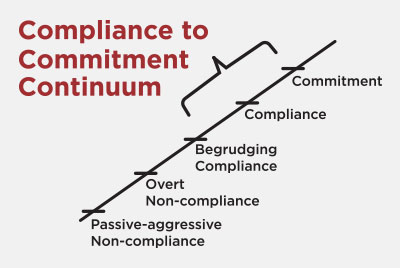Building a Culture of Commitment and Accountability
By Rich McLaughlin, McLaughlin Consulting Services and Primeast Limited –
July 12, 2023

As someone who works with leaders around building cultures where people want to fully show up to work each day, I get questions about “commitment” and “accountability” quite a bit. While there is no single practice that gets you there, there are some that help and some we need to abandon. I like to use the continuum below to get a sense of where a majority of the people are in the organization I’m working with. The usual answer from clients ranges from begrudging compliance to commitment.
I also ask clients if “compliance” is good enough for their business model, because if it is, that is certainly easier. Real commitment is harder, and many leaders are finding that to recruit and retain good talent these days, they need to do more than just push for compliance. Commitment requires leaders to stop caretaking AND employees to step up more. So, how do we get there? Here are four practices that help, from easiest to do to more difficult.
Give People The “Why”

This is so simple; I‘m surprised to still hear from people inside organizations: “We’re often told the what, but sometimes we’re not told the why.” This is unfortunate, especially because it takes very little effort, and leaders must understand that telling them why just once may not be enough. It is also about helping staff understand the big picture and how what you’re asking them to do fits into that picture.
Forget the Carrots
There are still a number of organizations that think employee retention and engagement is all about the “carrots” — rewards and recognition. We need to get away from the extrinsic motivators (e.g., bonuses, perks) and leverage intrinsic motivators more. According to Dan Pink, (ted.com/talks/dan_pink_the_puzzle_of_motivation) we need to tap into three intrinsic motivators:
- Purpose: the degree to which people feel connected to the work they do and how it serves the greater community
- Autonomy: the degree to which we give people room to do the work in a way that allows them to express their unique personality
- Mastery: the degree to which people feel they can deepen and broaden skills they feel are important
Of the three intrinsic motivators above, I think purpose has the most power and is probably the least leveraged. Lately, I find I am advising companies on how to onboard people effectively and connect them to the company’s purpose right away.
Bring Forward Worthy Questions Rather Than Answers
When it comes to strategies to move the organization forward, smart leaders are realizing they need to take the right question to people inside the organization and challenge them to discover the best response — a “design thinking” approach. This approach has the double benefit of less stress on leadership and more engaged staff who are given an opportunity to shape and influence the direction of the organization.
Be More Personal
Probably the best — but most difficult — way to create a culture of commitment and accountability is to make our workplace more personal, not less. This challenges those in leadership positions to “go first” — to be more personal and transparent, to care enough about the people working for them to want to know about their personal lives. Leaders can be personal and still hold people accountable.
A caution about making things more personal: You can’t mandate any of this. You can only invite people to participate. Make it clear that not participating is perfectly fine. As more people come around to the idea, they will influence many of the rest to come along.
My last caution to leaders is to not take this all on yourself. Everyone contributes to the prevailing culture, so challenge employees to step up and help out. This quote by Peter Block sums it up well: “There is the dominant belief that leadership should come from the top and bosses are in some way responsible for their employees’ performance and morale, much as loving parents are responsible for their children. Holding on to this line of thought represents the choice of dependency over empowerment. Empowerment means that each member is responsible for creating the organization’s culture, for delivering outcomes to its customers and especially for the quality of their own experience. This is the adventure…”
 | Richard McLaughlinRichard McLaughlin, M.A., is a principal at McLaughlin Consulting Services. More content by Richard McLaughlin: Learn more from Richard McLaughlin: |
This article appeared in the Summer 2023 issue of New Jersey CPA magazine. Read the full issue.